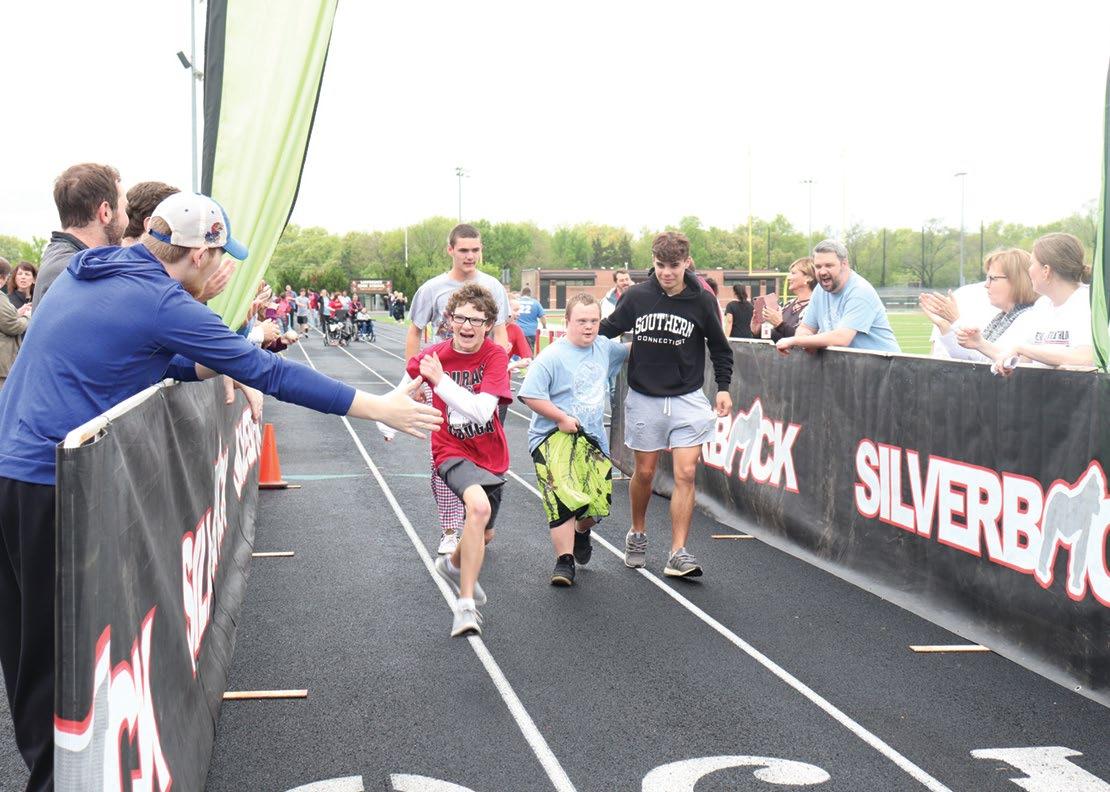
13 minute read
A Culture of Change
‘Be the change you wish to see in the world.
’– Mahatma Gandhi
Advertisement
A Culture of Change
Sustainability has many facets, one of the most important being to create a society where people’s health and well-being are being protected both today and in the future. by Tara Trenary, photos by Steven Hertzog and courtesy of USD 497
24 In society today, meeting the needs of people without jeopardizing the ability of future generations to meet their own needs can be complicated. But, why is working hard toward a community’s overall health and well-being so complex? Jasmin Moore, City of Lawrence and Douglas County sustainability director, says sustainability can be all encompassing and must include collaboration with community members and city and county departments on a wide range of topics, including energy efficiency and performance, greenhouse gas emissions, implementation of a food system plan, safe routes to schools, health and work equity, and the creation of a climate action and adaptation plan, among other things. “I like to define sustainability as living today like you really believe there is going to be a tomorrow, and the next day, and decades from now,” she explains. “I believe that when people think in this way, we tend to be more responsible with our financial resources, treat our environment with more care and extend more compassion and respect to those around us.” Treating all members of society fairly; reinforcing participation and a sense of community; supporting health and well-being; providing the security and services needed by community members: All of these topics encompass the definition of social sustainability, a complex piece of the three pillars of sustainability. The other pillars are environmental and economic, the three together informally referred to as “people, planet and profits.” Issues related to social sustainability are abundant, which is why it’s not always easy to effectively incorporate it into modern society. Human rights, fair labor practices, living conditions, health, safety, wellness, diversity, equity, worklife balance, empowerment, community engagement, philanthropy, volunteerism, social responsibility, social justice, cultural competence, community resilience and human adaptation are all factors that must be addressed when trying to maintain a socially sustainable environment. So, why is it important in our community?
Sunflower Elementary’s Kendall Patterson’s first grade class learn about sustainability from KU teaching assistant Clara Boggs

Children Are Our Future Nothing is more important than teaching our kids about the importance of sustainability so future generations can reap the benefits of their educated ancestors. And, “people, planet and profits” are intertwined when it comes education. Right now, with challenges including climate change, mental health, homelessness, deforestation, pollution and the overall stress of living in a world with so many consequential issues, understanding people’s needs and desires, and the effects our actions have on the entire community is key. Lawrence Public Schools is at the helm of this powerful endeavor. “In addition to preparing our students with academic knowledge and skills, our schools are ensuring that they graduate with important life skills, such as critical thinking and problem-solving, creativity and innovation, initiative and self-direction, resilience and social and emotional wellbeing, communication and social and cross-cultural skills,” explains Denise Johnson, assistant director of fine arts, health, physical education and wellness for USD 497. Her role is to support the well-being of district students and staff. “We want our graduates to be educated, well-rounded citizens who contribute in positive ways to the health and vitality of their communities.” USD 497 focuses on many aspects of social sustainability
and wellness within its schools in regard to students and employees. Those include education and lifelong learning, lifestyle wellness, mental and emotional wellness, nutritional wellness, physical wellness, and social and relational wellness. The district has implemented a five-year strategic plan, including five areas of focus and year-one initiatives, with common threads of equity, excellence and community engagement throughout the plan. Some of those include: Cohesive Curriculum • Identify what students should know and be able to do pre-K through 12-plus. • Use instructional resources that honor and preserve students’ diverse cultural backgrounds. Student-Centered Learning • Meet students’ unique academic, social, emotional and behavioral needs. • Decrease barriers to college and career readiness preK through 12-plus. Safe and Supportive Schools • Encourage positive student behaviors, and reduce behaviors that interfere with learning. • Provide safe and welcoming schools that engage every student. Effective Employees • Create positive and supportive work environments for all employees. • Attract high-quality candidates for all employee groups. Data-Informed Decisions • Use data to inform all instructional decisions. • Develop systems that support student-focused, databased decision-making. Johnson says keys to the success of the Lawrence Public Schools are committed and dedicated teachers and staff, engaged and motivated students, actively involved school families and a resource-rich community that truly values public education. “Lawrence is a community of learners,” she says. “If you spend some time in our schools, you will see students thinking critically, celebrating diversity, openly debating current topics of importance to our country and the world, finding their own voice and advocating for others, organizing fund-raisers to meet the basic needs of those facing quality-of-life challenges and working together in teams to problem-solve and arrive at creative solutions. “We want all students to achieve at high levels and graduate prepared for success in college, careers and life,” Johnson says. “We hope that our students become lifelong learners who are empowered to pursue their personal hopes and dreams for the future and make positive contributions to their communities.” For employees specifically, USD 497 offers an employee assistance program, monthly wellness meetings, wellness representatives in each school, flu clinics, professional
GET LYNN ON THE LINE! 758-843-LYNN 40 YEARS EXPERIENCE + CUTTING EDGE TECHNOLOGY
ELECTRIC • Commercial • Industrial • Multi-Family • Design Build • Design Assist • Remodel
SERVICE • 24-Hour Service • Commercial • Industrial • Residential • Parking Lot Lighting • Panel Upgrades
Peer support specialist Theresa Bird listens to Danny Hartman at her office inside the lobby of the Lawrence Public Library

growth opportunities, financial assistance, drug and alcohol resources, a smoking cessation program, cooking classes, nutrition/lifestyle management meetings and workshops, gym discounts, wellness challenges, maternity/women’s programs, legal assistance and services, resources for seniors, trauma and abuse services, and suicide resources. USD 497 also has plans for its staff for the future. It will organize fall and spring intensive healthy-eating programs and schedule two districtwide wellness fairs. It hopes to increase community partnerships and the number of wellness representatives from each school and department. It will meet with each school and department to personally explain the benefits of the employee assistance program. And, postfall and spring, wellness posters will be placed in each building and department. “Our schools are microcosms of the larger Lawrence community,” Johnson says. “We want everyone in our community to feel safe, welcome and supported, and to have equal access to opportunities to learn, achieve success, pursue their interests and reach their full potential.”
Peer Support Workforce The World Health Organization estimates that untreated depression and anxiety lead to approximately $1 trillion in global productivity losses each year. With more support available within the community, this number could be much lower. “There is a mental health crisis in Douglas County—suicide statistics, for instance, are nothing less than alarming,” explains Melissa Fisher Isaacs, information services coordinator at Lawrence Public Library. “The population experiencing homelessness is growing. There are indications that
Melissa Fisher Isaacs, information services coordinator at the Lawrence Public Library Denise Johnson works with a student from Schwegler Elementary during their garden opening day. The Adapted PE Triathlon is where middle and high school special education students participate in swimming, biking and running to provide a lifetime of health and wellness



substance abuse is on the rise. And, even for those who are not experiencing a mental health crisis, there are many who are facing loneliness and social isolation.” The Douglas County Peer Fellows program aims to build a peer support workforce throughout the community and shape a culture of recovery where Douglas County residents live, learn, work and play. It connects trained individuals who share insight and wisdom through learned experience to community members who struggle with mental illness and addiction. The peer specialists offer emotional support and social support, along with resources that lead to better health outcomes while impacting as many community members as possible. Peer Support specialist Theresa Bird believes that adding these community resources and thinking outside of the status quo is essential to a sustainable (aka healthy) community. “Our emotional health informs every other aspect of our lives: personal connections (or disconnect from), health, career, etc.,” she says. “Peer Support recognizes this fundamental community need. When one of us is sick and alone, in a sense, we all are. Let’s move toward happiness and health the best we can.” In addition to personal experience with mental health and/ or substance abuse issues, the peers are highly trained. They have received a state-level certification and continue to receive ongoing training in topics such as mental health first aid, LEAP (Listen, Empathize, Agree, Partner), crisis intervention and group facilitation. One of the locations the Peer Fellows program is housed is at Lawrence Public Library (LPL). LPL is a good fit for the peer support program because it’s one of the few places in town that is free and accessible to almost everyone in the community, regardless of background or circumstance, Fisher Isaac explains. “It’s available without an appointment and on evenings and weekends. Also, visiting the library doesn’t carry the stigma that going to a mental health center might. “Peer support promotes well-being among our members by helping them to find a human connection and to identify goals and strategies for moving forward in a positive direction. Future generations benefit from the increased resilience of present-day community members,” Fisher Isaacs continues. “Providing low-barrier access to peer support can build a bridge between those in need and more intensive supports, as well as offering encouragement and a listening ear to anyone who needs it.” LPL’s overall mission is to connect community members with the information they need, but that information more and more has to do with community resources: what services are available in the community and how can they be accessed. “Our core service continues to be providing access to information, but information now comes in many formats, in addition to the printed word. We help to sustain the library as a viable institution by actively seeking to understand our community’s needs and working to meet those needs that align with our mission,” Fisher Isaacs says. Anyone needing assistance can start by stopping in be
Lawrence Farm 2 School runs an outdoor camp each summer at Billy Mills Middle School. Elementary students plant, harvest, and prepare food.

tween 3 and 5:30 p.m. Tuesday afternoons at the Community Resource Drop-In, located in the library lobby immediately after entering the front door. There you will be connected to agencies providing services related to food, shelter, job searching, eldercare, substance abuse recovery and many other needs.
Communal Living The environment in which a person lives can be one of the most important aspects of a person’s life. Those who desire a more communal existence might choose the option of cohousing. In the Delaware Street Commons (DSC) community, residents learn to share and to think of the group first rather than only thinking how a decision might benefit them as individuals. “Traditional forms of housing no longer address the needs of many people,” according to husband-and-wife design team Kathryn McCamant and Charles Durrett. They coined the term “cohousing” in 1988 and now create high-functioning neighborhoods all across the U.S. and Canada through their award-winning firm Durrett Architects. “Things that people once took for granted—family, community, a sense of belonging—must now be actively sought out. Cohousing reestablishes many of the advantages of traditional villages within the context of modern life.”

Let us manage your Lawrence investment property!







Affordable rates. We handle the daily details and send you the money by direct deposit each month.
1037 Vermont Street, Lawrence, KS 66044 Office 785-841-7300 ext 1 | Toll-Free 800-883-0412 www.HomesForLease.org www.HedgesRE.com
Lawrence Farm to School buys from 9 local farmers. Buying from local farms means professional development is required. Rick Martin is instructing a food service group on knife skills.

Rich Minder is a founding member and resident of Dela- ware Street Commons, an East Lawrence cohousing neigh- borhood with 23 homes. He says DSC envisions creating an old-fashioned Kansas neighborhood in a new way, and its mission is to feel connected with and responsible for the residential environment; share the value and practice of ecologically responsible living; respect and give space to the life that members have beyond cohousing; and feel re- newed as a cooperative neighborhood through celebration and support. “Social isolation is very unhealthy,” Minder says. He be- lieves intention to know and collaborate with neighbors, as well as consensus decision-making and shared leadership, are important aspects when it comes to social sustainabil- ity. “I think that sustainability is a three-legged stool with environmental, cultural and economic aspects that are all mutually reinforcing.” DSC offers shared garden space, common outdoor areas, a common house with an exercise area, a great room and hearth room, kitchen, laundry, mail room, a kids room. DSC neighbors are currently designing together a building with shared resources such as a wood shop, greenhouse and sauna. “Predictability and commitment are mutually reinforcing in building a pattern of rituals that sustain and renew commu- nity,” Minder explains. “These rituals can be anything that triggers recognition by participants, including potlucks, ple- nary meetings, workdays—anything that creates positive patterns.” Living within a community like DSC promotes human con- nection and offers the benefits of shared resources and re- sponsibilities, and social and emotional connectivity, among other things. “I hope DSC can serve as a witness to other people to be intentional about how you build relationships with people of time and space. Loneliness kills. I think DSC provides a place and time to resist the centrifugal forces that tend to isolate people in an increasingly globalizing digital and technological age,” Minder says.
Above: Perry Kennard is the 8th grade science teacher and garden coordinator at Southwest Middle School. The gardeners at SW harvested grapes and canned jelly for the Farmers Market on Clinton Parkway. Right: Delaware Street Commons Back row from left: Diane Taveggia, Anna McCoy, Gay Minder, Linda Peckham, Rich Minder, Samuel Beecher, Laura Odell. Front row: Henry, Vicki Penner, Kylee Beecher, Teri Grunthener


Shaping Our Culture Social sustainability can be hard to define, but it’s integral in today’s society. It encompasses all human activities and must be embraced just as strongly as environmental and economical sustainability for future generations to benefit. “Sustainability is much more than individual action. It requires us to look at the systems that shape our culture and ask ourselves how we can change the systems to create a more sustainable community,” LawrenceDouglas County’s Moore says. p









